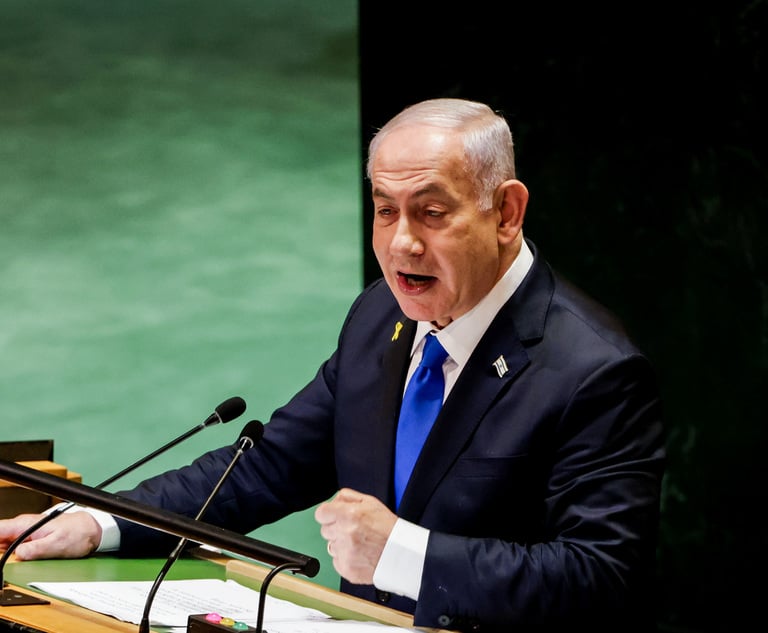 Credit: Andrii Yalanskyi/Adobe Stock
Credit: Andrii Yalanskyi/Adobe Stock Report: Weak Institutions Hamper Corruption Fight in Latin America
Lawyers from global and Latin American firms pan efforts to tackle corruption in the region, and rank countries from best (Uruguay) to worst (Venezuela).
March 17, 2022 at 04:30 PM
4 minute read
Efforts in Latin America to counter corruption are insufficient and ineffective, according to a report released Wednesday by the Lawyers Council for Civil and Economic Rights of the Cyrus R. Vance Center for International Justice.
Lawyers at more than a dozen firms across the Americas, including global firms Simpson Thacher & Bartlett and Shearman & Sterling, collaborated on the report, which found that laws to counter corruption in Latin America are unproductive if they aren't accompanied by implementation.
"Efforts to combat corruption in the region are insufficient, particularly because authorities are not independent and do not have the capacity to implement existing legislation," said Jaime Chavez Alor, Latin America policy director at the Vance Center and coordinator of the council.
Worryingly, lawyers have observed setbacks in the independence and capacity of authorities in Guatemala, Mexico and Peru.
"The legal community must play a more active role in ensuring that the application of the law is more effective," added Chavez Alor.
Furthermore, efforts to prevent corruption in the region fall short while institutions charged with countering corruption lack independence and do not have the capacity to investigate and punish corruption.
The Lawyers Council, which consists of 18 prominent lawyers in private practice from 14 countries in the Americas, aims to combat corruption and to support the rule of law and the work of civil society.
"This report focuses a spotlight on the tragic gap between largely successful efforts by the OECD and others to establish, in many jurisdictions, statutes that check all the boxes, without a commensurate level of political will and investment in the agencies to make effective those laws," Todd Crider, head of Simpson Thacher's Latin America practice and member of the Lawyers Council, said in a statement to Law.com International.
Antonia Stolper, former head of the Latin America affinity group at Shearman, is also a member of the Council.
"What remains strikingly clear is that although in many countries on paper there is an adequate legal framework to combat corruption, the political will to do so with resources, trained personnel and independent prosecutors and judges is just not there," she said.
The Council sought input from additional lawyers across the Americas to compile the report. Some lawyers and organizations agreed to be named as contributors, while others preferred to remain anonymous.
The latest report on corruption assesses legal efforts and shortcomings in preventing and redressing corruption in 17 countries. The first edition of the Latin America Anti-Corruption Assessment was published in 2020.
Legal experts in each country employed quantitative and qualitative criteria to rank the success of anti-corruption efforts from 10 (highest) to zero (lowest). Uruguay came out on top, for the most effective anti-corruption efforts, while Venezuela was at the bottom.
Significant recent setbacks in the region include Brazil's disbandment of the Lava Jato anti-corruption task force in 2021, and a year later its narrowing of preventative arrest, which was a tool used to successfully compel white-collar cooperation and plea bargains.
In Mexico, President Andrés Manuel López Obrador has reduced the pay and resources of Mexican watchdog institutions since taking office in 2018, while launching frequent rhetorical attacks on corruption that have yet to result in actual prosecutions.
Perhaps most dishearteningly, Guatemala disbanded the highly effective United Nations-sponsored International Commission Against Impunity in Guatemala (CICIG) in 2019.
Then the government went after Guatemalan jurists who worked closely with CICIG, such as former attorney general Thelma Aldana. Aldana, now in exile in the U.S., signed on as a collaborator on the Vance Center report, as did exiled former anti-corruption prosecutor Juan Francisco Sandoval.
The Cyrus R. Vance Center for International Justice of the New York City Bar Association seeks to advance global justice by engaging lawyers across borders to support civil society and encourage an ethically active legal profession.
This content has been archived. It is available through our partners, LexisNexis® and Bloomberg Law.
To view this content, please continue to their sites.
Not a Lexis Subscriber?
Subscribe Now
Not a Bloomberg Law Subscriber?
Subscribe Now
NOT FOR REPRINT
© 2024 ALM Global, LLC, All Rights Reserved. Request academic re-use from www.copyright.com. All other uses, submit a request to [email protected]. For more information visit Asset & Logo Licensing.
You Might Like
View All
ICC Issues Arrest Warrants for Israeli Prime Minister Over Alleged War Crimes in Gaza
3 minute read
Lawyers Among Those Convicted as Hong Kong High Court Sentences 45 Activists to Prison


Clifford Chance Under Fire for Human Rights Assessment of Saudi Arabia World Cup Bid
5 minute readLaw Firms Mentioned
Trending Stories
- 1Revenue Up at Homegrown Texas Firms Through Q3, Though Demand Slipped Slightly
- 2Warner Bros. Accused of Misleading Investors on NBA Talks
- 3FTC Settles With Security Firm Over AI Claims Under Agency's Compliance Program
- 4'Water Cooler Discussions': US Judge Questions DOJ Request in Google Search Case
- 5Court rejects request to sideline San Jose State volleyball player on grounds she’s transgender
Who Got The Work
Michael G. Bongiorno, Andrew Scott Dulberg and Elizabeth E. Driscoll from Wilmer Cutler Pickering Hale and Dorr have stepped in to represent Symbotic Inc., an A.I.-enabled technology platform that focuses on increasing supply chain efficiency, and other defendants in a pending shareholder derivative lawsuit. The case, filed Oct. 2 in Massachusetts District Court by the Brown Law Firm on behalf of Stephen Austen, accuses certain officers and directors of misleading investors in regard to Symbotic's potential for margin growth by failing to disclose that the company was not equipped to timely deploy its systems or manage expenses through project delays. The case, assigned to U.S. District Judge Nathaniel M. Gorton, is 1:24-cv-12522, Austen v. Cohen et al.
Who Got The Work
Edmund Polubinski and Marie Killmond of Davis Polk & Wardwell have entered appearances for data platform software development company MongoDB and other defendants in a pending shareholder derivative lawsuit. The action, filed Oct. 7 in New York Southern District Court by the Brown Law Firm, accuses the company's directors and/or officers of falsely expressing confidence in the company’s restructuring of its sales incentive plan and downplaying the severity of decreases in its upfront commitments. The case is 1:24-cv-07594, Roy v. Ittycheria et al.
Who Got The Work
Amy O. Bruchs and Kurt F. Ellison of Michael Best & Friedrich have entered appearances for Epic Systems Corp. in a pending employment discrimination lawsuit. The suit was filed Sept. 7 in Wisconsin Western District Court by Levine Eisberner LLC and Siri & Glimstad on behalf of a project manager who claims that he was wrongfully terminated after applying for a religious exemption to the defendant's COVID-19 vaccine mandate. The case, assigned to U.S. Magistrate Judge Anita Marie Boor, is 3:24-cv-00630, Secker, Nathan v. Epic Systems Corporation.
Who Got The Work
David X. Sullivan, Thomas J. Finn and Gregory A. Hall from McCarter & English have entered appearances for Sunrun Installation Services in a pending civil rights lawsuit. The complaint was filed Sept. 4 in Connecticut District Court by attorney Robert M. Berke on behalf of former employee George Edward Steins, who was arrested and charged with employing an unregistered home improvement salesperson. The complaint alleges that had Sunrun informed the Connecticut Department of Consumer Protection that the plaintiff's employment had ended in 2017 and that he no longer held Sunrun's home improvement contractor license, he would not have been hit with charges, which were dismissed in May 2024. The case, assigned to U.S. District Judge Jeffrey A. Meyer, is 3:24-cv-01423, Steins v. Sunrun, Inc. et al.
Who Got The Work
Greenberg Traurig shareholder Joshua L. Raskin has entered an appearance for boohoo.com UK Ltd. in a pending patent infringement lawsuit. The suit, filed Sept. 3 in Texas Eastern District Court by Rozier Hardt McDonough on behalf of Alto Dynamics, asserts five patents related to an online shopping platform. The case, assigned to U.S. District Judge Rodney Gilstrap, is 2:24-cv-00719, Alto Dynamics, LLC v. boohoo.com UK Limited.
Featured Firms
Law Offices of Gary Martin Hays & Associates, P.C.
(470) 294-1674
Law Offices of Mark E. Salomone
(857) 444-6468
Smith & Hassler
(713) 739-1250









